In today’s competitive job market, product managers can’t afford to turn a blind eye to product manager interview questions.
That’s if you want to increase your chances of landing a PM job. Granted, companies across the globe all use their own unique approach to scout for talent and bring them on board as part of their team.
That said, when conducting interviews for product manager roles, most recruiters aim to find out three things about you:
- Your personal background, personality, and character as a professional.
- Your experience in the field of product management.
- The value you bring to their organization if they hired you as a product manager.
Therefore, the most common product manager interview questions all help recruiters unearth insight on one or more of these three categories.
This guide is a comprehensive compilation of common product manager interview questions and answers.
Study these questions and answers ahead of time to prepare yourself for your next product manager interview. That way, you’ll stand a greater chance of impressing your interviewer.
We have divided and categorized these questions into the following headings:
1. Product Management Questions
2. Technical Product Management Questions
3. Product Roadmap Questions
4. Product Prioritization Questions
5. Product Design Questions
6. Product Analytics Questions
7. Product User Questions
8. Communication Questions
9. Cross-Functional Team Questions
Let’s dive right in.
1. List of Product Manager Interview Questions: Product Management
Here is our list of top product manager interview questions, kicking things off with our product management-related questions and answers.
1. What qualities make a product great?
This question is a favorite among recruiters whenever they’re scouting for product managers. This is because the answer to this question provides them with insight into how you view product design and development from a general standpoint. It also lets them know more about the possible design features and modifications that you may implement in their own products. Most of all, this product manager interview question is one of those that will tell a recruiter how much you know about creating great products.
For that reason, prospective product managers need to respond to this question with utmost precision. Granted, there is no hard and fast rule to design a great product. After all, each product is different and will have its own unique set of features.
However, when responding to this question, you must state that there are universal elements that characterize products that perform well. A product must:
- Have a unique value proposition.
- Solve a problem experienced by a given target market.
- Be simple and easy to understand.
- Allow users to leverage it in an efficient and effective way.
2. What changes would you make to our product? What would you build?
This is yet another direct question that recruiters enjoy asking product manager candidates. In line with the previous question, this one serves to provide the interviewer with clear insight on how you would impact the company in your role as a product manager. In this case, the recruiter aims to find out your initial thoughts on what type of product is best suited for the organization.
If the company does not yet have a product created, then you will have to explain your product proposal in its entirety. If the company already has a product, then you will have to dive into the features that you would either add or modify.
Answering this question requires in-depth knowledge of the company’s target market, objectives, and product line. For that reason, the response you will give will vary from company to company.
However, the important thing to remember is that you should touch on how the product will be unique and will add value to the company’s customers. You should also highlight how the product and its respective features will not pose a hassle for the company’s users in terms of its usability.
Here are some additional product management-related questions that recruiters tend to ask:
3. What do you believe are the qualities of a great product manager?
4. What aspects of product management do you enjoy the most? What do you dislike the most?
5. What software development method did you use at your last job? What did you like or dislike about it? What methodology do you prefer the most?
2. List of Product Manager Interview Questions: Technical Product Management
Let’s.move on to technical product management-related questions:
1. Name your favorite software tools to manage team members. Explain how you use these software management tools.
This is yet another product management-related question. Here, the aim is to get a feel for the type of tools, applications, and software that the candidate uses when they’re on the job as part of their management strategy. In this case, the question specifically asks how candidates manage team members.
Once again, the answers you get will vary as every candidate will have their own preferred set of tools that they use to manage team members.
That said, the best candidates will make mention of some of the most popular management apps out there. These include Asana, Monday.com, Trello, Bamboo HR, and Zoho, among others.
The key here is for the candidate to first describe what the app is, and then break down how they use it to manage their team members. In doing so, you should show the benefits that the app can bring to people management.
2. How do you align the technical team with the product vision and overarching goals of the company?
Some recruiters might reserve this question for a technical product manager interview. However, most product manager interviewers tend to include this question in their interview process since it is more people management-related as opposed to technical.
With that in mind, the question invites candidates to touch on the strategies they use to unify the technical team with product strategy.
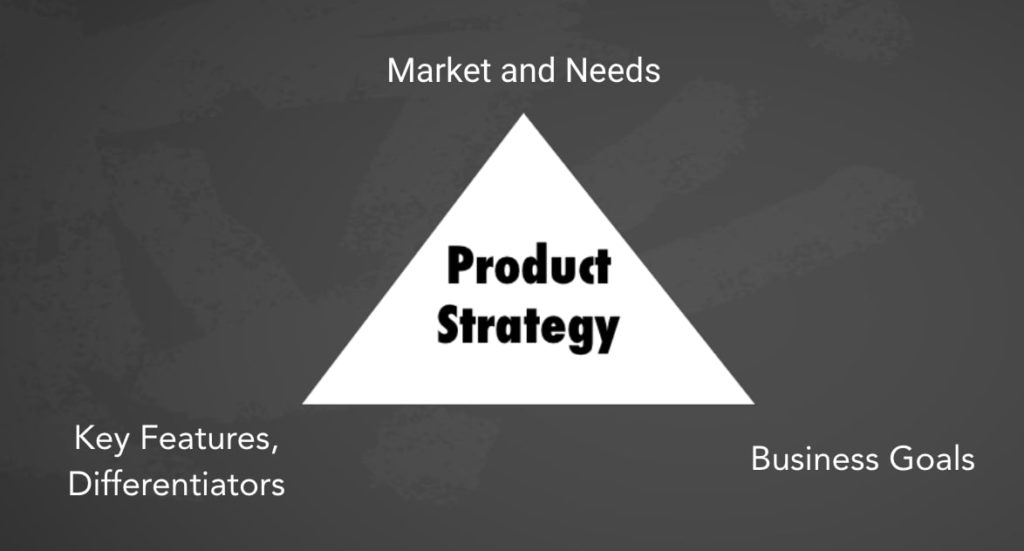
The nature of the question implies that fluid communication and frequent follow-ups will be crucial in this phase.
Candidates should refer to the importance of conducting as many meetings as necessary. In doing so, they must mention how important it is to sensitize the technical team and orient them on the product vision as well as the company’s overarching goals.
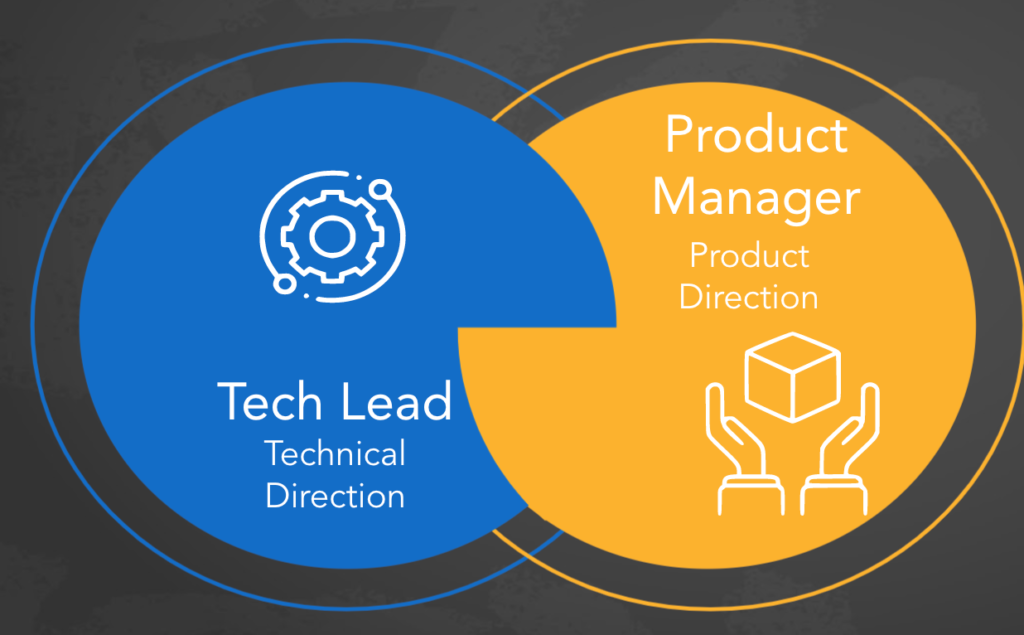
The best candidates will also speak to the passive and active resistance that the technical team will display either before or during the development phase. You must mention how your meetings will help to reduce any type of resistance. Be sure to indicate that you will conduct ad-hoc meetings as needed in order to resolve specific concerns that one or more team members may have.
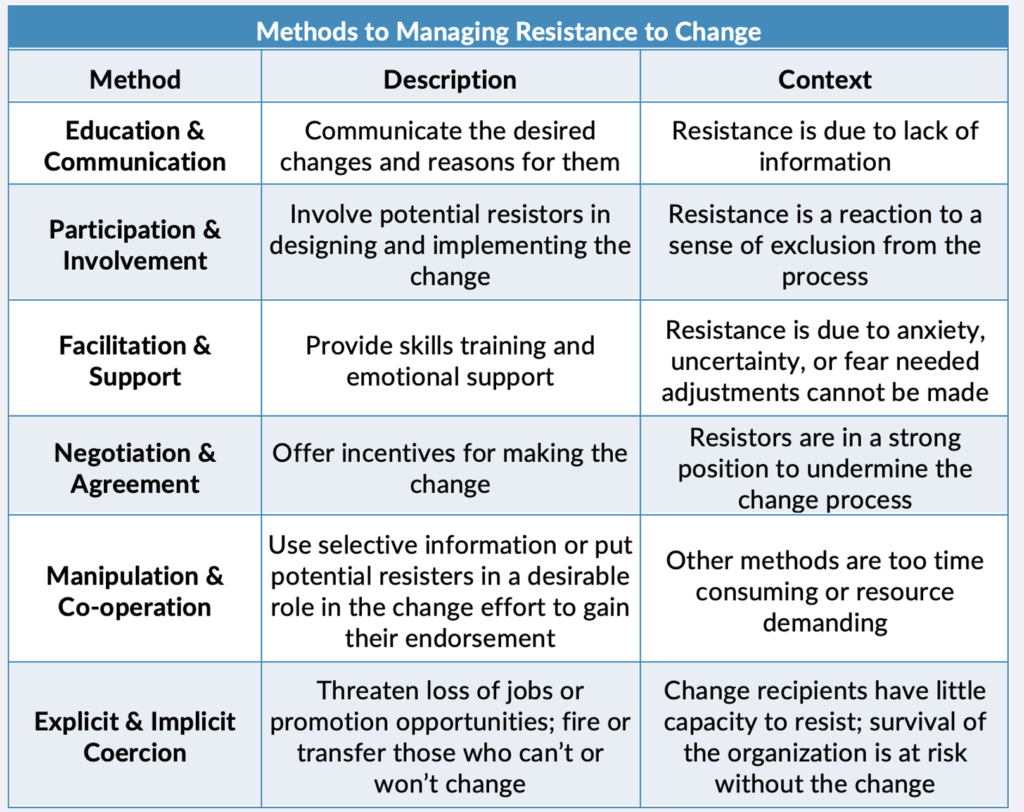
Credits: Baton Global
Here are some more technical product management-related questions that recruiters can ask:
3. Talk me through how you would write an algorithm to recommend friends to add.
4. Explain how you would write an algorithm to recommend contacts to add.
5. Describe how you would write an algorithm to recommend articles to a user.
6. You are a Product Manager working on a mobile photo application. Your CEO asks you to decide whether the app should display high-resolution or resolution photos. Walk me through how you would investigate this.
7. Walk me through the process of how you would rank Tweets on someone’s feed when they log back in.
8. Explain machine learning to a 6-year-old.
9. Break down recursion to someone who has no technical knowledge of it whatsoever.
10. You are the Product Manager for a consumer live streaming app and there is a performance problem with all live streams lagging in a particular geography. Explain how you will go about diagnosing the issue.
3. List of Product Manager Interview Questions: Product Roadmap
Let’s turn our attention now to the product roadmap questions you need to prepare for:
1. Describe some of the most important inputs you take into account when crafting your product roadmap. Explain why you use them.
With this question, interviewers want you to provide key insight into the things you value the most when creating product roadmaps.
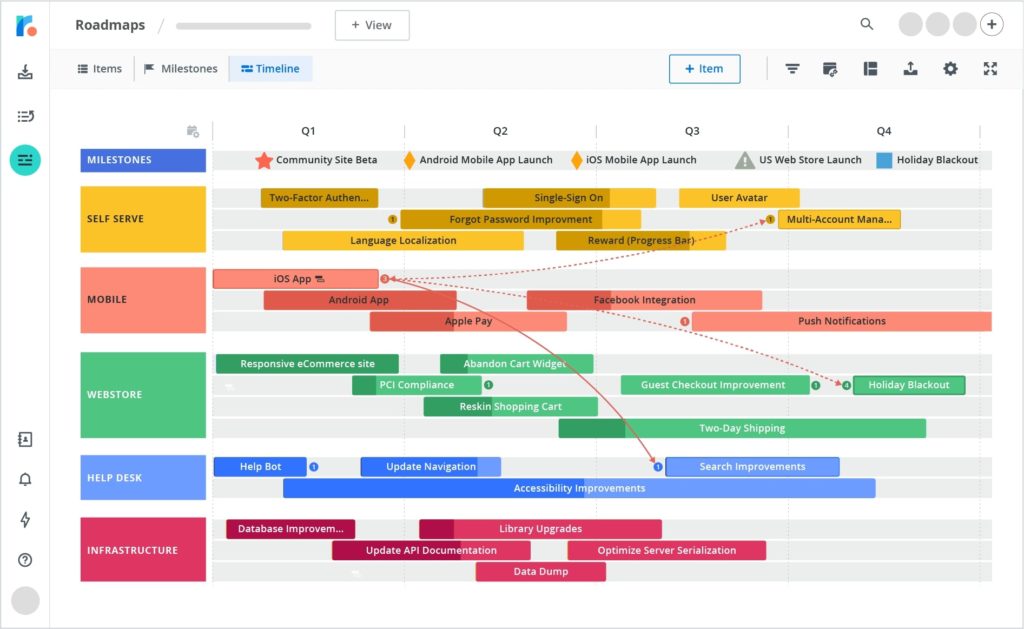
Credits: Roadmunk
Recruiters understand just how instrumental product roadmaps are. Not only do they define the technology that will be used to build the product, but they also condition the development team’s workflow.
For that reason, figuring out how you piece together a product roadmap will let them know how good your product management skills are.
The best candidates know that the most important inputs are market-related, strategy-related, and technology-related. The key, however, is to know why these inputs are important.
For example, in the case of market-related inputs, product managers need to express how customers, prospects, competitors, and the target market all impact a product roadmap.
The same goes for strategy and technology: candidates must be able to show a clear link that shows why how inputs are directly related to product roadmaps and vice-versa.
Here are some more common product roadmap questions that recruiters may spring on you in a product manager interview:
2. Talk me through how you managed the roadmap for your previous product.
3. Describe how you communicate the product roadmap to all of the relevant teams at your company.
4. Create a roadmap for an imaginary product.
5. One of your highest paying customers demands a feature from you. This feature wasn’t included in the initial product roadmap. Describe how you will react.
6. You are the Product Manager for Groups. Discuss how you will create both a one-year as well as a five-year roadmap.
4. List of Product Manager Interview Questions: Product Prioritization
It is usual for interviewers to ask you about product prioritization. However, these questions do come up every now and again. The main question you can expect is the following:
1. Talk me through your preferred prioritization framework. Discuss the pros and cons of using it.
Product prioritization is one of the most important skills that product managers can develop.
Of course, there are several frameworks which you can use. Here’s an example of the Kano Model which is used to prioritize product features. Just like all other frameworks, the Kano Model has its advantages and setbacks.
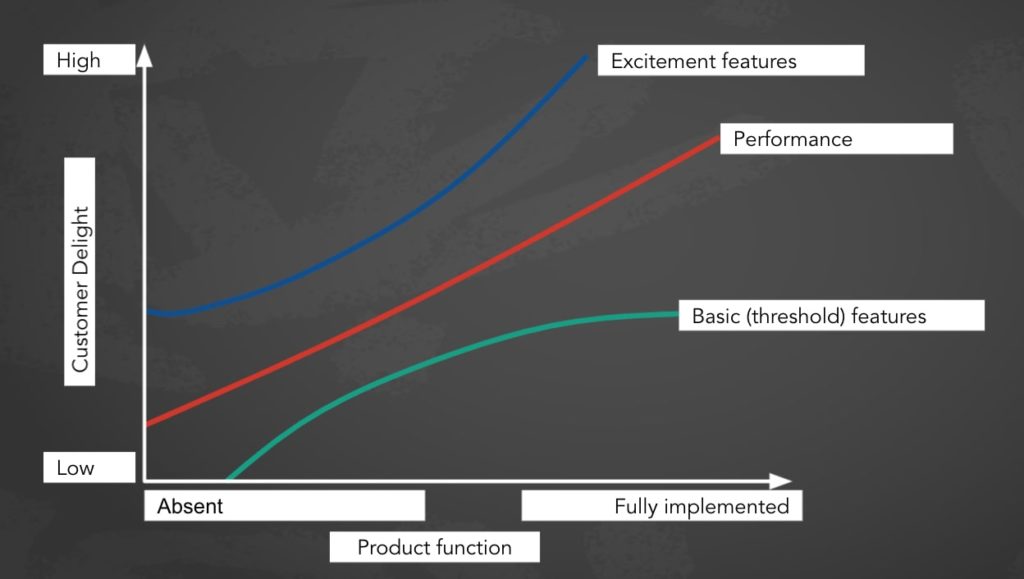
Be sure to state the possible pluses and drawbacks to the prioritization framework you use.
5. List of Product Manager Interview Questions: Product Design
Let’s turn now to product design questions.
1. Discuss the major changes you will make to the product in order to maximize functionality and efficiency. Describe how long it will take to implement these changes.
This question is similar to some of the questions seen in the product management section of this product manager interview questions and answers.
Recruiters understand that the most direct way to find out what a candidate thinks of their product as well as how best they believe it they can improve it.
When answering this question, candidates need to keep in mind two keywords. The first is ‘functionality’, which has to do with how product usability. The second is ‘efficiency’, which has to do with how well the product serves its purpose.
Candidates should make product suggestions that are related to functionality and efficiency. In doing so, you should branch off into product upgrades that improve customer retention and user engagement. In the case of functionality, you ought to highlight speed while highlighting cost-of-operation in the case of efficiency.
In doing so, candidates should be able to provide a general idea of how long it would take for these changes to be put in place.
Here are some additional product design questions that you may face in a product manager interview.
Product Manager Process Questions
- Explain to me when you know that a product design is complete.
- Talk me through a time when you had to cut a feature that would make your product more usable. Describe how you prioritize this as well as how you convey this to your design team.
- Discuss how you eliminate possible product features during the ideation process.
- Define great product design.
Product Manager Design Case Study Questions
- Talk about your favorite product and explain what you like about it.
- Explain how you would improve our company’s product.
- Walk me through how would you design an ATM machine for a blind person,
- Go through how you would design sunglasses for a baby.
- Give me your dream design of an umbrella.
- How would you improve the restaurant list feature on UberEats?
- Let’s take a look at the company’s home page on mobile. How would you improve it?
- If you were to build the next big feature for our company, what would it be?
- You are a Product Manager at Apple and senior management wants you to build a birthday app. How do you design it?
- You are a Product Manager for Videos. How do you decide whether to design videos to be auto-play vs. click-to-play?
6. List of Product Manager Interview Questions: Product Analytics
Now, we’ll dive into questions related to product analytics questions.
1. Discuss in what cases of predictive analysis are Bayesian methods more suitable for data analysis than other techniques.
This is a two-part question. With this type of question, the recruiter’s goal is to test a candidate’s knowledge of data analysis techniques and their respective best practices.
Candidates should begin by providing a definition of what the Bayesian paradigm is. You can say something like the following: ‘The Bayesian paradigm is a tool used to provide a coherent approach to specify sophisticated hierarchal models for complex data. Bayesian methods, in turn, allow one to estimate model parameters and construct model forecasts that can later be used for data model comparisons.’
Once the definition has been given, the candidate must then describe when Bayesian is better than other techniques, such as frequentist statistics. Of course, the answer that the candidate gives will be based on the type of technique that they wish to compare.
In the case of Bayesian and frequentist statistics, candidates should mention that Bayesian methods are considered to be more sound forms of predictive analysis than frequentist methods. Candidates can then go on and mention the objection against the use of the P value in frequentist hypothesis testing. You can also state that Bayesian methods use no null and alternative hypotheses, thus making predictive analysis insights much more reliable.
Here are some more product analytics questions. To help you organize them, I’ve categorized the questions based on points of similarity.
Product Manager Guesstimation Questions
- How many windows are there in New York City?
- How much money does a Safeway in San Francisco make every day?
- How many coffees does an average Starbucks serve every day?
- How many bottles of shampoo are produced in the U.S. every year?
- How many firefighters are employed in the U.S.?
Product Manager Product Metrics Questions
- Talk me through a time where a deeper analysis of your product’s metrics led to a completely different feature decision.
- Discuss a time where you came up with an experiment around a product metric and tested it.
- Talk through a product metric that you were responsible for improving and the steps you took to do so.
- Define statistical significance.
- How long would you run a split test before declaring a winner?
- Pick one of our company’s products. You are now responsible for building a dashboard that will show all relevant metrics to our team on a daily basis. What do you track?
- Let’s pretend that you are a Product Manager and you just launched Groups. How do you determine if the launch was a success?
- You are a Product Manager of a peer-to-peer rental marketplace. When you check your dashboard this morning, you noticed that hourly revenue has dropped by 30% as compared to the previous 14-day moving average. What do you do to diagnose and address the issue?
- You are a Product Manager at Snapchat and you notice that DAU has dropped by 20%. What do you do?
- You are a Product Manager working on an e-commerce company’s checkout flow. What would be the top metrics that you would track and why?
- You are a Product Manager for Search. How do you measure the success of the product?
- You are a Product Manager for the Timeline and Reactions are slotted into the roadmap. How do you decide which reactions to design and launch? How would you measure the success of the launch?
Product Manager Pricing Questions
- How would you price a newly launched product?
- You are the product manager for the Netflix Core product and the CEO wants you to figure out if it makes sense to lower the monthly subscription price. What would be your plan to figure out whether or not to lower the pricing?
- Imagine you are a new product manager for Amazon Prime and you are thinking through how to price the product. The two current options have a $35 minimum spend with one option for $8 to deliver within 1 hour and the second option for free delivery within 2 hours. How do you analyze the current pricing and determine if pricing changes are necessary?
Product Manager Strategy Questions
- Why do you think Messenger is a stand-alone application?
- Why do you think Amazon acquired Whole Foods?
- Pick an industry that will look completely different in 10-20 years. How would you make sure our company would be able to adapt to that industry?
7. List of Product Manager Interview Questions: Product User
We’ve already examined possible product analytics questions. Let us turn to some common product user questions that interviewers can ask you in a product manager interview.
1. Break down the process you use to gather user feedback. Explain how you interacted with your users in a previous company.
This question is a favorite among interviewers. This is because the answer you give will provide recruiters with the insight they need to gauge how you leverage consumer data in order to improve their product.
The answer you provide will vary. One of the major factors that will influence your user feedback process will be the type of product you are collecting data on. Another huge element is the type of customers that you are targeting.
However, regardless of the process you use, the key is to state the importance of using both statistical data as well as qualitative data. The best product managers understand that statistics tend to be insufficient in gauging how a user feels about a given product. For that reason, you must allocate part of your user feedback strategy to collecting qualitative data samples that you can analyze and extract meaning from.
Here are some more questions on gathering product user feedback:
2. What was your process for gathering feedback from users? How did you use this feedback to shape your roadmap?
3. How do you know if your users are satisfied with your product?
4. How do you think about onboarding new users to your product?
8. List of Product Manager Interview Questions: Communication
We move on to the communication segment of our list of product manager interview questions.
- You just started as a new Product Manager on a mature product that is about to release a major update. You have been tasked with the press release for the update. Given you are a new Product Manager, what steps do you take to ensure you write the best possible press release?
This question seeks to determine just how good your communication skills are. A product manager cannot be successful in their role if you do not practice proper communication. Granted, it is true that managers are always expected to communicate. However, in the case of product management, the need for proper communication is even more important than it is in standard managerial positions. As a product manager, you constantly liaise with multiple teams and individuals, sometimes all at once.
Given the nature of the task you have to do, you have to speak about the importance of effective persuasive writing. You should mention that the writing should generate excitement among your target audience while still respecting the brand, image, and voice of the company.
I have included a sample communication framework below to provide you with additional guidance on what goes into solid communication strategies.
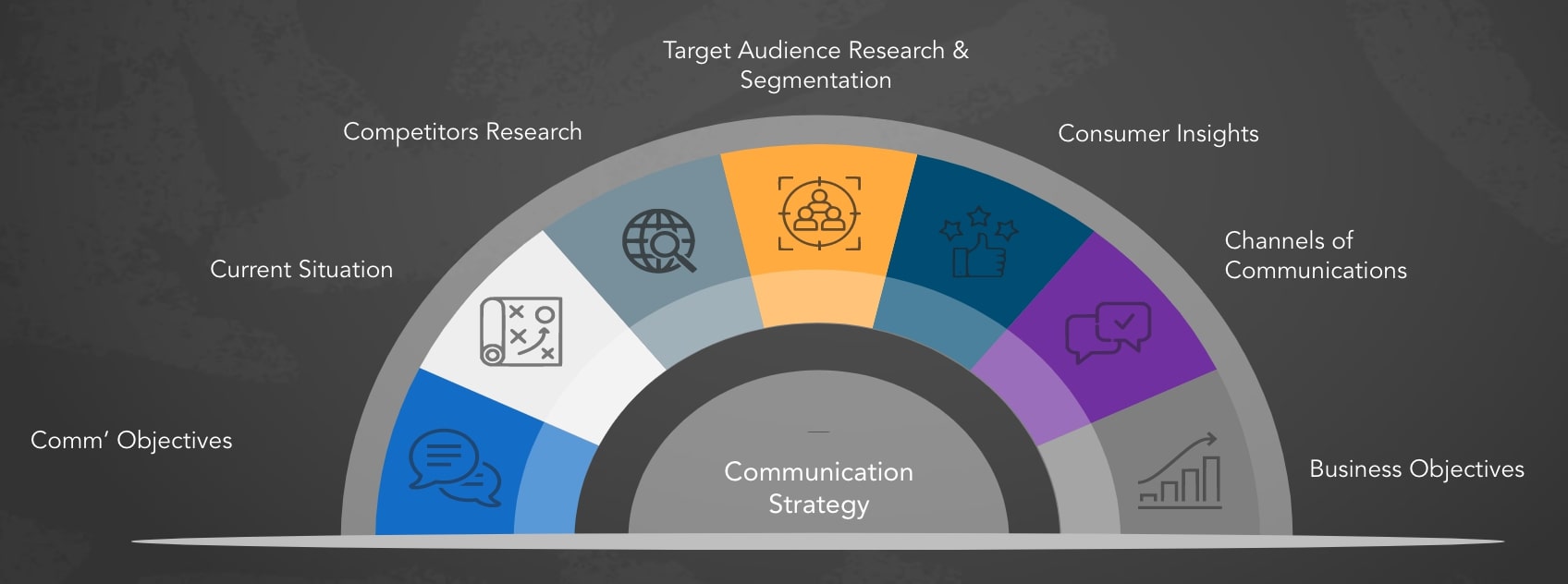
Here are some additional communication questions that an interviewer can ask you in a product manager interview.
2. Your latest release shipped a bug that drastically affected 0.1% of your user base and those users have been sending in angry feedback about their product experience. How do you structure your communication to them to help appease them until you have time to ship a hot-fix within the next few days?
3. Your hiring manager recently went on vacation and cannot be reached. On top of that, a significant enterprise deal for you is currently being negotiated, and your team would have to build many new features to be able to win the deal. How do you work through this situation?
9. List of Product Manager Interview Questions: Cross Functional Teamwork
We have now come to the final segment of our product manager interview questions. These questions are open-ended. The responses you provide will depend on the kind of experience you have in leadership and managerial roles.
- Describe how you have collaborated with a design team to ship a product or feature.
- Talk about how you have worked with an engineering team to ship a product or feature.
- Imagine that an engineer disagrees with you. How will you work through the issue?
- Tell me about a time where a designer disagreed with you. How did you resolve that conflict?
- Talk me through a time where you had to work with several different teams to coordinate a product launch.
- Your engineering team has proposed a technical design that you don’t agree with. How do you go about figuring the best path forward?
- Talk me through a time where you had to say ‘no’ to senior management.
- Do you manage teams in different functions differently? How do you do it?
If you are new to product management and are looking to break into your first product role, we recommend taking our Product Manager Certification Course, where you will learn fundamentals of product management, launch your own product, and get on the fast track towards landing your first product job.
